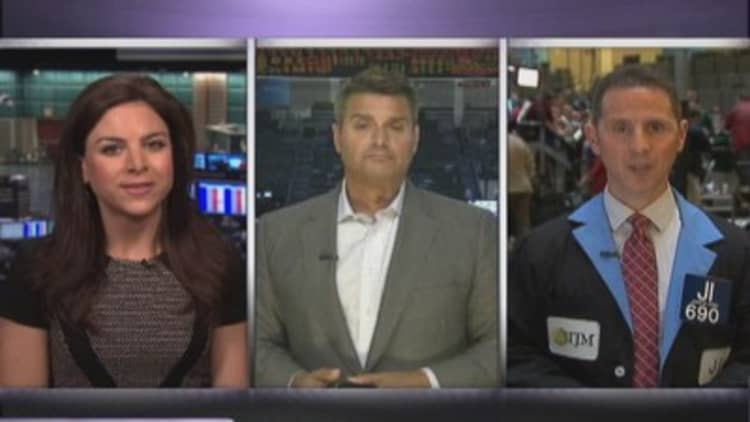With the era of zero interest rates nearing its close in the U.S., some analysts are beginning to worry that bonds on the short end of the yield curve may face a selloff.
"A lot of clients in Asia today are buying fixed income products with leverage. Many in the last couple of years have bought fixed income products but levered them up to enhance the return, because cheap money has been available from banks," said Anuj Khanna, CEO for South Asia, at Pictet Wealth Management, which oversees around $446 billion in assets.
Read More Why investors keep buying expensive bonds
"As quantitative easing comes to an end, there is a risk in the coming months that the short end of the yield curve can spike. If that were to happen, interest rates will rise, which means that people borrowing to invest could suffer the double whammy of the borrowing cost going up and the price of bonds going down," he said.
It isn't clear rates are set to head higher any time soon.
In testimony before a joint Congressional committee last week, U.S. Federal Reserve Chair Janet Yellen walked a fine line between preparing markets for normalizing monetary policy from its crisis era levels, and assuring the public that the Fed would continue to safeguard a still fragile recovery.
Despite isolated patches of weak data, analysts believe the Fed will continue to wind down its massive bond purchases, and that monetary policy will gradually grow more restrictive.
Read More Bonds vs. bond funds: What you need to know now
While Yellen may have struck a cautious tone, Pictet expects the days of ultra-low rates are numbered.
"We are becoming more and more confident about the growth in the U.S.," Bhaskar Laxminarayan, Pictet Wealth Management's chief investment officer for Asia, said. "That naturally means there has to be an exit in terms of this low (or zero) interest rate policy."
Others also see a significant risk to the bond market as rates rise.
Read More Red flag waves over junk bonds as money pours into high yield
"The whole financial system today is based on leverage," noted Steve Goldman, managing director at Kapstream Capital, a fixed-income manager with over 6 billion Australian dollars ($5.6 billion) under management. "It's the reason why high yield and investment grade credit spreads are where they are today. It is the driver of value today," he said.
"The risk to financial markets today is that rates go up and people aren't able to borrow at the zero rate," Goldman said. He believes all risk assets, including some government bonds from weaker countries, could face a selloff.

To be sure, he noted that the main risk would be if the Fed were to surprise the market, possibly by raising rates faster than expected, a move he views as unlikely.
Richard Jerram, chief economist at private banker Bank of Singapore, also expects rising rates may spur a selloff, but added it would likely be "nothing particularly extreme."
He noted, "There does seem to be quite a lot of underlying demand for bonds."
Read More Are EM companies the real debt worry?
Around $72.82 billion has flowed into bond funds so far this year, outpacing the $41.92 billion that made its way into equity funds, according to data from Jefferies.
Indeed, Pictet isn't advising avoiding bonds altogether, just the shorter end of the curve. Its balanced portfolio advises keeping around 30 percent in fixed income, although that's down from around 33 percent in 2011.
"It is thin pickings in the bond market," Laxminarayan said.
Read More Keep bonds but stay alert: Advisors
Pictet likes U.S. sovereign bonds as it expects the U.S. dollar to gain ground. It is planning to increase its allocation to emerging market corporate bonds as it believes interest rates in much of Asia and to a lesser extent Brazil and Turkey have normalized.
Pictet still sees a "little bit" of value in European periphery bonds, but it expects that story is "coming to an end," Laxminarayan said.
While many analysts believe U.S. high-yield bonds are too expensive, Pictet is still invested in the segment.
"People haven't really priced in this recovery process in the U.S.," he said.
—By CNBC.Com's Leslie Shaffer; Follow her on Twitter @LeslieShaffer1


